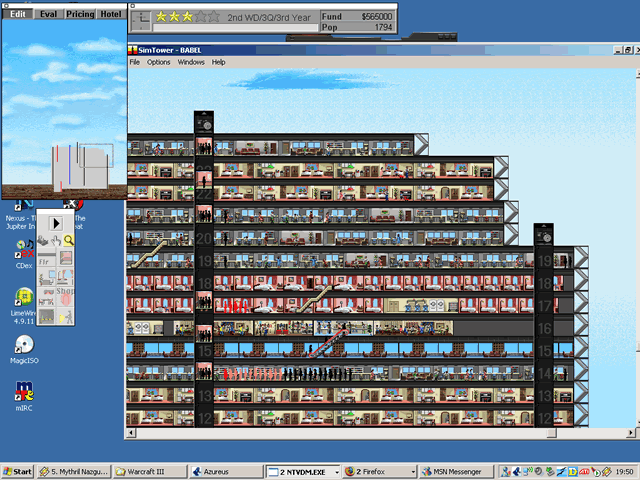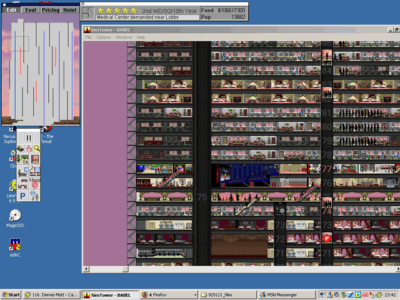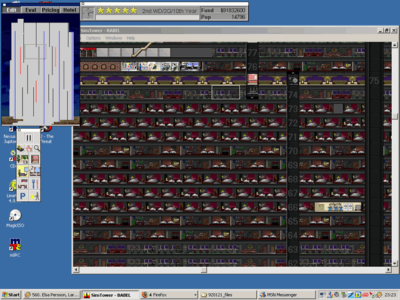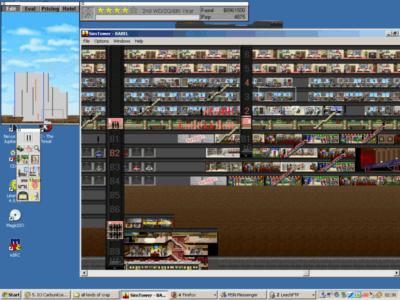
SimTower
Written by: Stoo
Date posted: August 22, 2005
- Genre: Strategy
- Developed by: OpenBook Co., Ltd.
- Published by: Maxis
- Year released: 1995
- Our score: 6
Maxis are of course known for their range of Sim titles. Most notably, the game of freeform soap opera and furniture arranging known as The Sims, as well as the veteran Simcity series that gives you godlike control over an entire metropolis. Also tho, during the early 90s they tried their hand at other sim games, keeping the general theme of a sandbox where you are the controller of some kind of domain, building it up over time from humble beginnings, as you see fit.
This one was in fact originally created by a Japanese company, then licensed for western release by Maxis. It does fit their basic formula pretty well, after all. The aim is to build your very own commercial tower, which entails designing the basic structure, allocating space within to various kinds of tenant, and keeping an elevator system running along with some basic amenities. As your tower gains inhabitants and reaches certain achievements you can gain higher star ratings, allowing access to new features with which to further enhance your vertical empire.
You start the game with little more than a flat patch of land, a couple of million in the bank, and of course greedy capitalist dreams. It’s not too daunting a start though; the interface is simple enough and there are only a few building options initially available. Your bread and butter is offices which are steady earners, with rent arriving on a quarterly basis. You can also build condos within your tower – these are sold as opposed to rented which means you’ll get an immediate lump sum but no further income. Aside from these, you’ll also want a lobby on the ground floor and a few fast-food joints. People need to be able to access all this, so you must also build an elevator or two and maybe a few staircases.
 After enticing just a few hundred people to live or work (or both) here, you’ll find your humble tower given a shiny new two-star rating. This allows you to build hotel rooms, another handy earner. Make it to a population of a thousand and you’ve reached three stars. Now the tower is starting to look more sizable and you have new commercial options like shops, cinemas and restaurants. From here you can aspire to four and five stars, before reaching reaching the ultimate goal of a hundred floor skyscraper, containing fifteen thousand people and featuring a cathedral at the very top.
After enticing just a few hundred people to live or work (or both) here, you’ll find your humble tower given a shiny new two-star rating. This allows you to build hotel rooms, another handy earner. Make it to a population of a thousand and you’ve reached three stars. Now the tower is starting to look more sizable and you have new commercial options like shops, cinemas and restaurants. From here you can aspire to four and five stars, before reaching reaching the ultimate goal of a hundred floor skyscraper, containing fifteen thousand people and featuring a cathedral at the very top.
It’s certainly mildly addictive for a while at least, laying down new floors of offices and shops and watching your little people go about their daily lives. The tower follows a daily routine; so offices open at 9am, people go to lunch at midday, hotel rooms are booked in the evening and so on. Build an apartment in the middle of the night, and no-one is actually going to move in until the next morning (ok that’s still a lot faster than real life propert purchases). A nice touch is, you can name a certain number of your inhabitants, allowing you to see at any later point with a click where they are and how they’re doing. People have to be kept happy you see, and each has a stress rating. Also any kind of tenant they occupy (office, apartment) has its own satisfaction gage.
In terms of customer satisfaction, the most important factor you can affect is the elevator layout. People don’t like to be kept waiting when they’re on the move – they’ll even turn red as an indicator of their frustration. Standard elevators can only cover a span of thirty floors, whilst express elevators can cover any distance but will only stop on every fifteenth floor. So you need a comprehensive network of both to make sure all floors are well served. There are a few options you can play with such as how far away an empty elevator car will respond to a call, although frankly I largely ignored these and just made sure each shaft had the full possible allowance of eight cars. Staircases and escalators – each spanning a couple of floors – will relieve some amount of stress on the system, but annoyingly the game only allows about sixty of them. Trust me, that’s not a lot in a large tower.

Do you have any idea how hard it was to get through this entire review without a single Mighty Erection gag?
There are a few more details that need attending to; offices will register unhappiness if near sources of noise such as a cinema, and tenants obviously are happier when paying less rent. You’ll also need a few basic facilities to keep the little people satisfied like parking spaces, rubbish collection depots, medical centers. Beyond that, however, you’ll find the dealing with the infrastructure isn’t especially detailed. When you think about it, some such factors as seen in Simcity could feasibly be scaled down to tower-sized issues. Water and electricity for example, to add some depth to the proceedings. Also while hotel rooms need cleaners who use their own service elevators, surely this could have been expanded. Don’t offices need cleaning too? What about the lobbies?
Another idea not seen is security guards patrolling for criminals and general dodgy types. You can in fact build security stations, but they do nothing unless one of two disaster events occurs – a fire or bomb threat. In which case your donut-fed men can actually get off their arses and start fighting the fire or looking for the bomb. However, you can instead spare them the effort if rich enough and just pay for the problem to go away, e.g. pay the fire service or the terrorist demand.
Overall, in fact, this is a pretty easy game. Apart from the very short list of disaster events, on the financial and customer satisfaction side it’s not especially difficult either. I didn’t encounter large scale problems with tenants getting angry and walking out until late in the game, at which point I was so incredibly wealthy I could just slash all their rents to keep ’em happy. I suppose you have to view this as a kind of software toy rather than a game in the usual sense. While you can still win in a sense, if only by meeting arbitrary goals, it’s pretty unlikely you’ll lose, as in go completely and permanently broke. You’ll just possibly make bad decisions that delay your reaching those goals. Still I’d have liked to see more challenge, and in turn more detail and infrastructure options to help provide that challenge.
Put it this way, I’ve never made any progress with Simcity, but I completed this over the course of about 2 days. Whilst being distracted by coding the site, dinner, and watching the latest episode of the new Battlestar Galactica. Which is a fantastic show, BTW, and in fact I could probably ramble on about the latest episode for longer than I could this game. In fact Simtower suited my dual-screen setup quite nicely as an undemanding distraction whilst something occupied the other screen. Not a classic of gaming, then, but not a bad way to spend a lazy Saturday afternoon either.



 Posts
Posts